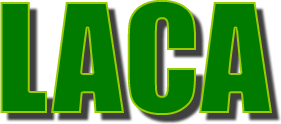
Logan and Albert Conservation Association

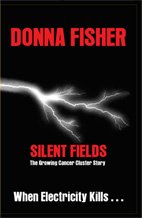 Electromagnetic hypersensitivity has been linked to cancer clusters in Brisbane according to local author Donna Fisher whose book Silent Fields published August 2008 relates the exciting account of the author and her neighbours in the Queensland suburb of Tanah Merah who without much technical, medical and legal experience did battle with the large public company, Energex to stop them from building an electricity sub-station in their street which they felt would be unsafe.
Electromagnetic hypersensitivity has been linked to cancer clusters in Brisbane according to local author Donna Fisher whose book Silent Fields published August 2008 relates the exciting account of the author and her neighbours in the Queensland suburb of Tanah Merah who without much technical, medical and legal experience did battle with the large public company, Energex to stop them from building an electricity sub-station in their street which they felt would be unsafe.
The breast cancer cluster at the Australian Broadcasting Commission's Toowong TV Studios - which has supposedly left the experts baffled yet again - has prompted the author to explain why situations such as this are occurring worldwide.
Donna Fisher urges researchers, enquirers and others to read, "Final Report on Electromagnetic Radiation and its links to Breast Cancer Cluster Occurrences" Access the following reports from website www.silentfields.com/reports.php
Read the report by EMC Technologies Report: B050401, dated 2 May 2005 which can be accessed now at: ABC_Toowong_EMR_Survey_Report.pdf
Then return back to us to read the report by the Australian Government Radiation Board - ARPANSA dated February 2007 which also can be accessed now at: ARPANSA_report.pdf
 Brisbane, Australia - July 10 2009 saw the launch of a national book reuse and recycling program to save thousands of books from landfill and help those in desperate need of educational resources. Most of us love a good book, but what happens to the book when we have finished reading it? In many cases it is probably packed into storage, gathering dust on the shelf or thrown out in the rubbish.
Brisbane, Australia - July 10 2009 saw the launch of a national book reuse and recycling program to save thousands of books from landfill and help those in desperate need of educational resources. Most of us love a good book, but what happens to the book when we have finished reading it? In many cases it is probably packed into storage, gathering dust on the shelf or thrown out in the rubbish.
Sustainable Insight, an online sustainability and environmental bookstore has taken an active step to extend the lifecycle of these books by launching ReRead, a new national book reuse and recycling program.
The aim of ReRead is to provide better resource management of books, by providing books donated by the public to charities, schools and not-for-profit organisations who are in need of resources for their libraries and education programs. Only books that are badly damaged and deteriorated beyond repair, will be recycled through an appropriate paper recycling service. In turn this is intended to reduce the number of books ending up in landfill and conserve the environment by encouraging the use of second hand books instead of new.
Visit the online bookshop website to find out more about the program and collection dropoff places.
A TRIBUTE TO FATHER BENEDETTO SCORTECHINI - A PIONEER, PRIEST & BOTANIST
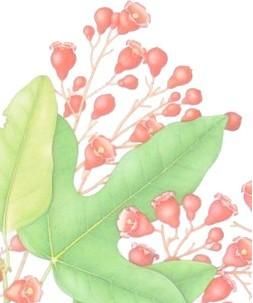 The name of Father Benedetto Scortechini is relatively unknown or forgotten today even within botanical circles, although many plant species bear his name. Many people know nothing of his life as a pioneer priest in the 1870's, or the part he played in the lives of our early settlers, particularly those of the Irish immigrants to the Logan area of SE Queensland.
The name of Father Benedetto Scortechini is relatively unknown or forgotten today even within botanical circles, although many plant species bear his name. Many people know nothing of his life as a pioneer priest in the 1870's, or the part he played in the lives of our early settlers, particularly those of the Irish immigrants to the Logan area of SE Queensland.
His significant contribution, as an avid botanist, to the scientific/botanical knowledge of the flora of SE Queensland, goes mostly unrecognized.
We would like to pay tribute to him by bringing his life and in particular his botanical discoveries and contributions to everyone's attention in this year of celebrations for the Sesquicentenary of Queensland.
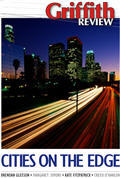 For the first time in history city dwellers outnumber their rural counterparts. What do the effects of urbanisation mean for nomads, indigenous communities, immigrants and Sydney's Aspirationals and Westies? Contributors from Griffith REVIEW 20: Cities on the Edge discuss what is gained, lost and overlooked in the rapid expansion and development of Sydney and the world's megacities.
For the first time in history city dwellers outnumber their rural counterparts. What do the effects of urbanisation mean for nomads, indigenous communities, immigrants and Sydney's Aspirationals and Westies? Contributors from Griffith REVIEW 20: Cities on the Edge discuss what is gained, lost and overlooked in the rapid expansion and development of Sydney and the world's megacities.
 Nature Deficit Disorder and its emotional and behavioural affects on children is becoming a hot topic world wide as more of the earth's citizens live in cities and towns. Planet Ark reports recently of the research and writings of American author and nature leader Richard Louv. We know that sitting around, as well as putting on weight, impairs kids in the long run. But now studies say that kids in touch with their natural world are healthier, perform better in school and have better self-images. They learn initiative and judgement. They use creative kinds of play.
Nature Deficit Disorder and its emotional and behavioural affects on children is becoming a hot topic world wide as more of the earth's citizens live in cities and towns. Planet Ark reports recently of the research and writings of American author and nature leader Richard Louv. We know that sitting around, as well as putting on weight, impairs kids in the long run. But now studies say that kids in touch with their natural world are healthier, perform better in school and have better self-images. They learn initiative and judgement. They use creative kinds of play.
The latest edition of Richard Louv's book Last Child in the Woods has updated research confirming that direct exposure to nature is essential for the physical and emotional health of children and adults.
Richard Louv's website includes links to other books, and numerous articles discussing this essential connection to nature. I recommend A Walk in the Woods Right or privilege? by Richard Louv published online in the March/April2009 issue of Orion magazine.
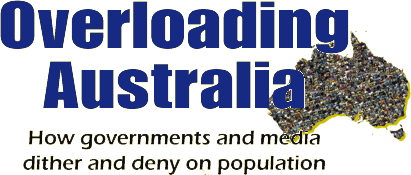 To build long term sustainable and happy communities we must stabilize our populations within the carrying capacity of our region.
To build long term sustainable and happy communities we must stabilize our populations within the carrying capacity of our region.
Co-author Mark O'Connor Mark will be building on the arguments in his previous book, This Tired Brown Land, which outlines the reasons for the low human carrying capacity of Australia.
"After a decade of being told Australia's population would naturally cap itself at under 25 million, or might even fall, we now discover it is growing at the more than Third World rate of 1.7% a year, and is on course to reach 42 million by 2050, and over 100 million by 2100," said Mark.
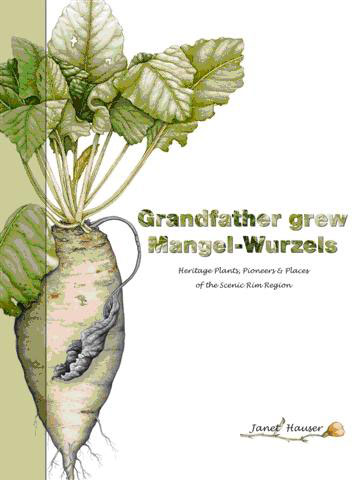 A collection of botanical watercolours in Grandfather grew Mangel-Wurzels : Heritage Plants, Pioneers and Places by botanical artist, historian and local Scenic Rim author - JANET HAUSER. The pioneering history, gardening and family histories of the Beaudesert area are beautifully presented in this work. Many old family photos are also included. The book was launched at The Centre where the original artworks are on display and available for purchase.
A collection of botanical watercolours in Grandfather grew Mangel-Wurzels : Heritage Plants, Pioneers and Places by botanical artist, historian and local Scenic Rim author - JANET HAUSER. The pioneering history, gardening and family histories of the Beaudesert area are beautifully presented in this work. Many old family photos are also included. The book was launched at The Centre where the original artworks are on display and available for purchase.
Copies of the book may be purchased from The Centre in Beaudesert.
Congratulations to Janet for her fantastic contribution to the local community!
A Big Fix: Radical solutions for Australia's environmental crisis by Ian Lowe
The warnings from scientists are urgent and unequivocal - our civilisation is unwittingly stepping in front of an ecological lorry that is about to flatten us. We are using resources future generations will need, damaging environmental systems and compromising social stability by increasing the gap between rich and poor.
As Ian Lowe says, 'If civilisation is to survive, this century will have to be a time of dramatic transformation, not just in technological capacity but also in our approach to the natural world - and each other. The road we are travelling now can only end in disaster.' In A Big Fix, this pre-eminent scientist and environmentalist tackles the problem head on and offers far-reaching solutions to our environmental and social crisis. He advocates a fundamental change to our values and social institutions and offers a vision of a healthier society - one that is humane, takes an eco-centric approach, adopts long-term thinking, uses our natural resources responsibly and is informed about the fragility of our natural systems.
Ian Lowe is emeritus professor of science, technology and society at Griffith University and President of the Australian Conservation Foundation
135 x 210 mm, 113 pages, paperback available from New Internationalist Bookshop.
A huge range of titles are available both on line and via bookshops and libraries. The catalogue or list is available here. Web specials, downloads, online ordering etc are available. This is also a useful tool to find new titles to request at your Council library. Some older resources are free eg from 2001 Resetting the Compass Australia's Journey Towards Sustainability. This work was highly was highly regarded. eg “This is a timely and important book which should be at least on your bookshelf, if not on your desk or even your shoulder-holster! ... The span of the book is truly impressive, and the language is always clear and compelling.” Ian Lowe, Griffith University, Brisbane (Australian Journal of Environmental Management v.8 no.3 September 2001)
In view of the hazardous outcomes of recent aerial spraying in Kerry Valley Scenic Rim these two older resources could be useful - Review of Agricultural Chemical Spray Drift and Spray Drift Management - both available as free downloads.
If you do read any of these titles and would like to submit a review please send it to ecoinfo[at]laca.org.au.
On my wish to read list are the following titles -
Native Mice and Rats written by Bill Breed and Fred Ford
Australia’s native rodents are the most ecologically diverse family of Australian mammals. There are about 60 living species – all within the subfamily Murinae – representing around 25 per cent of all species of Australian mammals. They range in size from the very small delicate mouse to the highly specialised, arid-adapted hopping mouse, the large tree rat and the carnivorous water rat. Native Mice and Rats describes the evolution and ecology of this much-neglected group of animals. It details the diversity of their reproductive biology, their dietary adaptations and social behaviour. The book also includes information on rodent parasites and diseases, and concludes by outlining the changes in distribution of the various species since the arrival of Europeans as well as current conservation programs.
Good Gardens with Less Water - companion to Kevin Handreck’s best-selling Gardening Down-Under
It is possible to have a great garden anywhere in Australia, even under the toughest water restrictions. Good Gardens with Less Water will show you how. This new book is a practical guide to gardening with limited water.